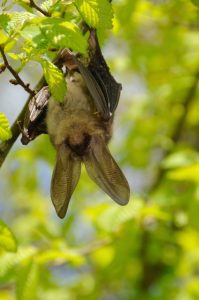
Customers researching for the best electricity rate in the down-state towns of Woodbury, New City, and others in the region are holding their breath, waiting.
They’re watching the big flap over the endangered Indiana Bat (Myotis sodalis) holding up the construction of the 7.8-mile Valley Lateral pipeline. The pipeline being built by the Millennium Pipeline Company will bring natural gas to Competitive Power Ventures (CPV) 650-megawatt power plant in Wawayanda in Orange county.
While it sound like another collision of environment and developers, the problem has actually gotten way more complicated. The story goes like this…
The Indiana bat is an endangered species of bat that winters in caves in six counties in New York State. In late spring, theses small bats roost under the peeling bark of dead and dying trees and form maternity colonies in the summer. Don’t like bats? Then prepared to become a BIG fan of bugs, especially mosquitos —which bats eat by the ton. In order to minimize disturbance to these maternal colonies, U.S. Fish and Wildlife Service recommends conducting clearing from November 15 to March 31.
Millennium Pipeline Company needs to cut down trees along the pipe route and then dig a trench to lay the 16 inch diameter pipe. To get all that in action, Millennium needs to get through the required permitting process. Cutting trees along the short route would probably take 10 days and getting the pipe laid, connected, and buried about another 30 days. However, the New York Department of Environmental Conservation doesn’t see it as an easy-peasy operation. Apart from jurisdiction disagreements, the DEC says it has one year to decide whether to grant the water quality certificate according to its own schedule, and not the companies or the FERC.
Millennium and CPV have headed off to ask the D.C. Circuit Court to force the DEC to rule on its application. The decision is expected to take 1 to 3 months, putting that announcement right in the midst of the bat’s nesting time. One growing concern across the industry is how construction delays this summer could effect the wholesale price of electricity. A similar battle over roosting Indiana bats is being fought in Michigan where some landowners are facing eminent domain lawsuits.
Meanwhile, back on Sept. 22, 2016, Federal authorities under direction of U.S. Attorney Preet Bharara charged Governor Cuomo’s friend and adviser, Joe Percoco, for soliciting more than $300,000 in bribes from two companies— one being CPV. The scandal certainly gave the governor a black eye along with his administration, and his efforts to transform the state’s energy future. But, as the saying goes, things are always darkest before they go completely black. Bharara, an Obama appointee, was recently one of 46 other US attorneys fired by the Trump administration.
From the shrill —if not bat-pitched — rhetoric from environmentalists and gas industry supporters it’s possible that the flap over the pipeline and Governor Cuomo’s energy agenda won’t quiet down even after all the bats come home to roost.
